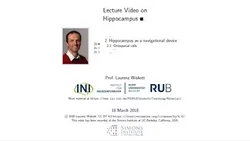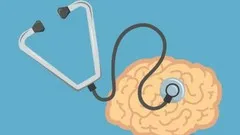
Hippocampus 
Hippocampus is a two-part course, with each part lasting 28 and 45 minutes respectively. It provides an overview of the anatomy and physiology of the hippocampus, as well as its role in memory and learning. It also covers the effects of aging and disease on the hippocampus. The course is designed to help learners understand the importance of the hippocampus and its impact on cognition. ▼
ADVERTISEMENT
Course Feature
![]() Cost:
Cost:
Free
![]() Provider:
Provider:
Youtube
![]() Certificate:
Certificate:
Paid Certification
![]() Language:
Language:
English
![]() Start Date:
Start Date:
On-Demand
Course Overview
❗The content presented here is sourced directly from Youtube platform. For comprehensive course details, including enrollment information, simply click on the 'Go to class' link on our website.
Updated in [February 21st, 2023]
Hippocampus - 2.3 (30 min).
Welcome to the Hippocampus course! This course is designed to help you understand the anatomy and physiology of the hippocampus, a part of the brain that plays an important role in memory and learning. We will cover the structure and function of the hippocampus, as well as its role in memory and learning. We will also discuss possible development directions and related learning suggestions.
The Hippocampus course will provide an overview of the anatomy and physiology of the hippocampus. We will discuss the structure and function of the hippocampus, as well as its role in memory and learning. We will also discuss the development of the hippocampus and its role in memory formation and recall.
Possible Development Directions: We will discuss the potential for further development of the hippocampus, including the potential for increased memory capacity and improved learning. We will also discuss the potential for the hippocampus to be used in the treatment of various neurological disorders.
Related Learning Suggestions: We will discuss various learning strategies that can be used to improve memory and learning. We will also discuss the importance of sleep and exercise in improving memory and learning. Finally, we will discuss the importance of nutrition in improving memory and learning.
By the end of this course, you will have a better understanding of the anatomy and physiology of the hippocampus, its role in memory and learning, and the potential for further development. You will also have a better understanding of various learning strategies and the importance of sleep, exercise, and nutrition in improving memory and learning.
[Applications]
Participants can apply the knowledge they have gained in Hippocampus - 2.1 and 2.2 to their everyday lives. They can use the techniques they have learned to improve their memory, focus, and concentration. Additionally, they can use the strategies they have learned to better organize their thoughts and ideas. Finally, they can use the tools they have learned to better manage their time and prioritize tasks.
[Career Paths]
1. Data Scientist: Data Scientists are responsible for analyzing large amounts of data and using it to develop insights and strategies for businesses. They use a variety of tools and techniques to uncover trends and patterns in data, and then use this information to inform decisions and strategies. Data Scientists are in high demand, as businesses increasingly rely on data-driven decisions.
2. Machine Learning Engineer: Machine Learning Engineers are responsible for developing and deploying machine learning models. They use a variety of techniques, such as supervised and unsupervised learning, to create models that can be used to make predictions and decisions. Machine Learning Engineers are in high demand, as businesses increasingly rely on automated decision-making.
3. Artificial Intelligence Engineer: Artificial Intelligence Engineers are responsible for developing and deploying AI-based systems. They use a variety of techniques, such as natural language processing and computer vision, to create systems that can be used to automate tasks and make decisions. AI Engineers are in high demand, as businesses increasingly rely on AI-based solutions.
4. Robotics Engineer: Robotics Engineers are responsible for developing and deploying robotic systems. They use a variety of techniques, such as motion planning and control, to create robots that can be used to automate tasks and make decisions. Robotics Engineers are in high demand, as businesses increasingly rely on robotic solutions.
Course Provider

Provider Youtube's Stats at AZClass
Discussion and Reviews
0.0 (Based on 0 reviews)
Explore Similar Online Courses

Textile Design Part 1 - Design An Illustrated Placement Print Illustration & Photoshop Skills

ABC of Singing - Fundamentals of Singing for Complete Beginners

Python for Informatics: Exploring Information

Social Network Analysis

Introduction to Systematic Review and Meta-Analysis

The Analytics Edge

DCO042 - Python For Informatics

Causal Diagrams: Draw Your Assumptions Before Your Conclusions

Whole genome sequencing of bacterial genomes - tools and applications

Control Your Subconscious Mind: Neuroscience Hidden Secrets

Perform an Excellent Neurological Bedside Exam


Start your review of Hippocampus